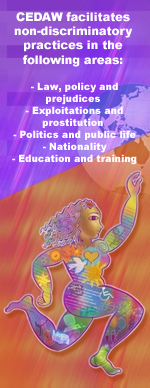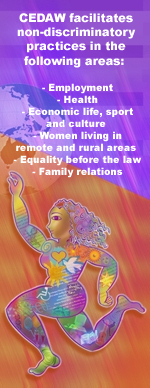Woman of the World - A guide to the rights in CEDAW
Woman of the World -
Know Your International Human Rights
- Preface
- What are human rights?
- What is the United Nations?
- The UN: Protecting the rights of woman
- What is CEDAW
- Australia's signing of CEDAW
- A guide to the rights in CEDAW
- CEDAW and the Sex Discrimination Act
- The Optional Protocol to CEDAW
- What about Beijing?
- What can you do: The public sphere
- What can you do: Private actions
 In signing CEDAW, Australia committed itself to being a society that promotes policies, laws, organisations, structures and attitudes that ensure that women are given the same rights as men. CEDAW facilitates this by promoting non-discriminatory practices in the following areas.
In signing CEDAW, Australia committed itself to being a society that promotes policies, laws, organisations, structures and attitudes that ensure that women are given the same rights as men. CEDAW facilitates this by promoting non-discriminatory practices in the following areas.
Law, policy and prejudices:
Article 2 of CEDAW urges all countries to work towards eradicating discrimination against women by introducing new laws or policy, changing existing discriminatory laws and providing sanctions for discrimination where it occurs.
Article 3 of CEDAW requires countries to actively promote women's full development and advancement, so that they can enjoy human rights and fundamental freedoms on the same basis as men.
Article 4 of CEDAW allows temporary special measures that favour women, on the basis that they are designed to speed up the achievement of equality.
Article 5 of CEDAW requires countries to address and change social and cultural patterns that reinforce the stereotyping of women and traditional gender roles, or that promote the relative superiority or inferiority of either of the sexes.
Exploitation and prostitution:
Article 6 of CEDAW requires countries to aim to eliminate all forms of trafficking of women and exploitation of prostitution of women.
Politics and public life:
Article 7 of CEDAW asserts that women should have the right to vote, the right to stand for election, be involved in formulating government policy and actively participate in political parties, lobby groups and NGOs.
Article 8 of CEDAW states that women should have the same opportunities as men to represent their countries internationally and be involved in the work of international organisations.
Nationality:
Article 9 of CEDAW requires that women have the same rights as men to acquire, retain or change their nationality and the nationality of their children. These rights are not affected by the choices of a woman's husband or changes to his nationality.
Education and training:
Article 10 of CEDAW urges countries to ensure that women have the same opportunities as men in all aspects of education and training - from kindergarten to tertiary education. Women should have access to the same curricula, professional staff and programs of continuing and adult education, especially those aimed at reducing any existing gender gaps within education, and opportunities to benefit from the same scholarships and grants as men. Governments are required to ensure that stereotypical concepts of the roles of men and women are eliminated.
Employment:
Article 11 of CEDAW requires countries to protect women's rights to work, to ensure that women have the same training and employment opportunities as men, that women receive equal pay for work of equal value, that women have access to the same benefits, compensatory schemes, and allowances as men, especially in relation to retirement and incapacity to work.
This Article further requires that countries prohibit discrimination in the workplace on the basis of marriage, pregnancy and maternity, and introduce paid maternity leave without loss of benefits or career opportunities, and encourage the provision of supporting social services to allow parents to combine family obligations with work responsibilities.
Health:
Article 12 of CEDAW requires countries to take all necessary measures to eliminate discrimination against women in the field of health care and ensure women and men have equal access to health services.
This Article further requires that countries provide free and accessible health services in relation to pregnancy and post-natal care.
 Economic life, sport and culture:
Economic life, sport and culture:
Article 13 of CEDAW expressly requires that women have equal access to family benefits, forms of financial credit, including mortgages, and the same rights as men to participate in recreational activities and cultural life.
Women living in remote and rural areas:
Article 14 of CEDAW requires all countries to ensure that the particular needs of rural women are met in relation to access to services, training and employment opportunities, and social equity schemes.
Equality before the law:
Article 15 of CEDAW requires countries to treat women and men equally in all matters relating to the law, including civil matters, contractual matters, and property ownership.
Family relations:
Article 16 of CEDAW requires countries to ensure that women and men have equal rights in the freedom to choose a spouse and enter into marriage; the same rights and responsibilities as men within marriage and upon divorce, especially with regards to choosing a family name, a profession, and the rights of ownership; and equal rights in all matters relating to the birth, adoption and the raising of children.

